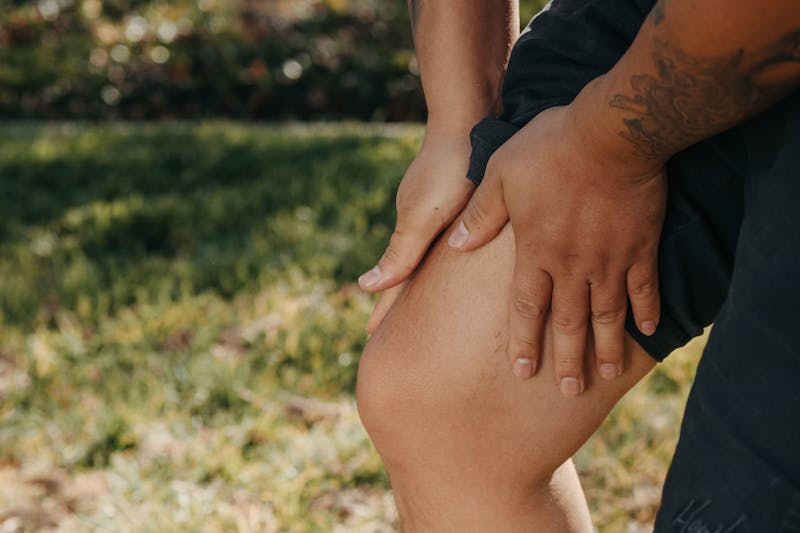
Easing Knee Pain Naturally with Ayurvedic Care
Aktie
Living with knee discomfort or stiffness can make even simple activities—walking, sitting, climbing stairs—challenging. It’s not just about missing out on hikes or workouts; even daily moments like comfortably sitting through a movie, driving, or playing with family can feel difficult. Over time, this can take a toll, affecting not just mobility but also confidence and overall well-being.
Many turn to conventional solutions, often finding temporary relief through medications or even facing the possibility of surgery. However, Ayurveda takes a holistic, non-invasive approach, looking beyond symptoms to understand why knee discomfort arises and how the body can regain balance naturally.
The Ayurvedic Perspective on Knee Discomfort
Ayurveda explains joint stiffness and discomfort as a result of imbalances in Vata dosha, which governs movement, lubrication, and flexibility in the body. When Vata becomes aggravated—whether due to aging, cold weather, improper diet, or overuse—it can lead to dryness and depletion of joint lubrication (Shleshaka Kapha), causing stiffness and discomfort.
In addition to Vata imbalance, Ayurveda identifies other potential contributors to joint challenges:
- Vata Accumulation in Joints → Excess Vata can cause a breakdown of natural joint lubrication, making movement more difficult.
- Ama (Toxin Buildup) → Poor digestion can lead to undigested metabolic waste (Ama), which may accumulate in the joints, contributing to stiffness and swelling.
- Circulatory Blockages & Weak Digestion → When circulation is sluggish, nutrients struggle to reach the joints, further impacting mobility and comfort.
Rather than offering a one-size-fits-all solution, Ayurveda works on identifying individual imbalances and restoring harmony through diet, herbal support, detoxification, and external therapies.
A Vaidya can examine each person’s unique situation to diagnose the cause of their knee pain and prescribe an effective regimen of botanical-formulated Ayurvedic supplements and lifestyle changes to reduce symptoms and relieve knee pain.
Ayurvedic Remedies for Chronic Knee Pain
1. Supporting Joint Lubrication & Balancing Vata Dosha
Since Vata imbalance is a common denominator in joint discomfort, Ayurveda focuses on restoring warmth, nourishment, and lubrication:
- Include warm, moist foods → Soups, ghee, cooked vegetables, and herbal teas help nourish the joints from within.
- Avoid cold, dry, or processed foods → These may aggravate Vata and contribute to joint dryness.
- Oil massages (Abhyanga) → Massaging joints with warm, medicated oils helps circulation and flexibility while supporting natural lubrication.
- Steam Therapy (Swedana) → Herbal steam therapies soothe stiffness and encourage relaxation.
Herbal Remedies
One of the most well-known aspects of Ayurveda is its embrace of natural herbs to help heal the body. People looking for Ayurvedic supplements for joint pain should consult an Ayurvedic practitioner for the best recommendations for their unique situation.
Below are some of the most commonly prescribed Ayurvedic supplements for bone and joint support:
- Ashwagandha – Traditionally used to support muscle strength, flexibility, and mobility.
- Guggulu – Known for its warming properties, supporting joint circulation, and promoting natural comfort.
- Nirgundi – Often applied topically, it may help soothe joints and improve range of motion.
- Rasna – Traditionally used to balance Vata and support joint comfort.
- Shallaki (Boswellia Serrata) – Modern research suggests that Shallaki supports cartilage health and natural mobility.
Scientific studies have confirmed the benefits of these herbs. For example, Boswellia (Shallaki) has been widely researched for its role in supporting joint comfort and flexibility, while Ashwagandha has been studied for its ability to support muscle strength and movement.
Detoxification Regimens
Since Ayurveda identifies toxins (Ama) as a contributor to joint discomfort, removing these impurities is an essential step:
- Virechana (Herbal Cleansing) – Supports digestive purification and toxin elimination.
- Basti (Medicated Enema) – Traditionally used to support lubrication and detoxification of the colon, which is closely linked to Vata regulation.
External Therapies
While internal balance is key, external therapies work synergistically to support joint flexibility and ease stiffness:
- Janu Basti – A specialized therapy where warm, medicated oils are pooled over the knee joint, allowing deeper absorption and nourishment.
- Pinda Sweda – Warm herbal poultices applied over joints to help open pores and encourage circulation.
- Ayurvedic Oil Massages – Using medicated oils like Mahanarayan Oil to soothe joints and promote flexibility.
Why Ayurveda’s Approach to Joint Support is Gaining Global Recognition
Ayurveda’s wisdom isn’t just based on ancient tradition—modern research is confirming why its holistic approach to joint care remains so relevant.
- Studies have demonstrated that Boswellia (Shallaki) supports natural joint comfort and cartilage health.
- Research shows that Ashwagandha supports flexibility and muscle strength.
- Ayurvedic detox protocols (Panchakarma) have been studied for their role in supporting long-term joint function.
At Ayushakti, we’ve spent over 38 years helping over 1.9 million people worldwide using evidence-based Ayurvedic protocols. With more than 42 published research papers in global medical journals, we continue to validate the effectiveness of these time-tested healing methods.
From this experience and research, we developed the Arthrox Plan—a structured Ayurvedic approach based on Siddha Veda healing frameworks specifically for knee and joint mobility support. If you’re looking for personalized Ayurvedic guidance, explore Ayushakti’s Joint Care Consultation.





